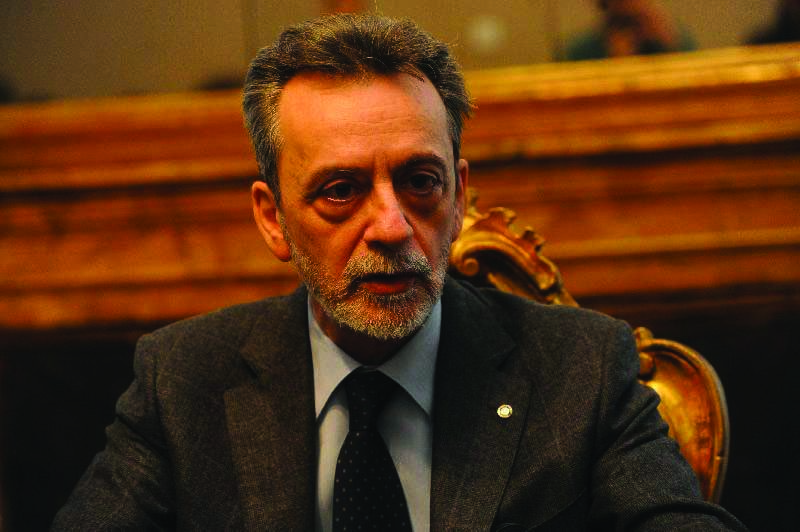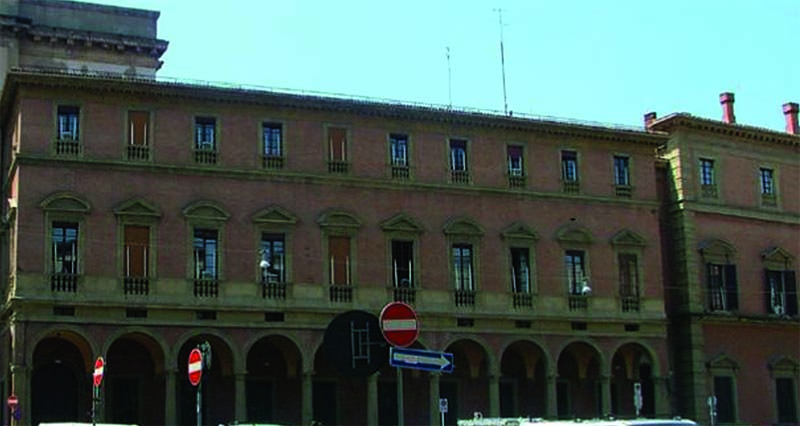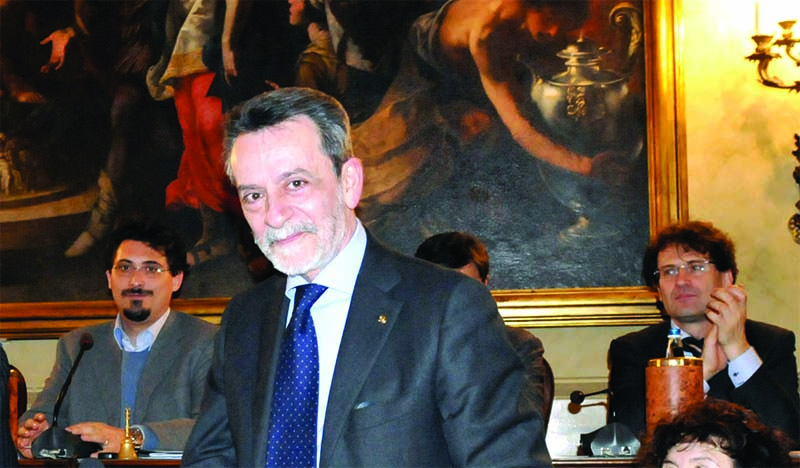A few months after taking office, we met Dr. Mario Ennio Sodano, Prefect of Bologna. Dr. Sodano distinguished himself for his fight against organized crime, and has been, only to mention a few of his previous responsibilities, Special Commissioner for the Health Authority of Naples 4, dissolved because of the infiltration of the Camorra, as well as Prefect of Vibo Valentia, where the power of dissolution of regional public authorities was repeatedly applied because of the infiltration of criminal organizations. He was also active regarding immigration issues and the integration of political refugees. He was entrusted numerous ad hoc mandates from regional entities and other public bodies for his expertise in the preparation of municipal statutes and administrative regulations.
Dr. Sodano, when you were holding the position of Chief of Staff to the Prefecture of Perugia, in 1998, you handled the earthquake emergency measures in Umbria. In the few months spent at the head of the Prefecture of Bologna, what is your experience of the Emilia reality and your reaction to the earthquake of 2012?
Since I started performing my duties as Prefect of this province and from the earliest contacts with representatives of administrations and institutions in the area, I realized that, despite the global crisis of recent years, this is a land that remains healthy and full of energy, capable of momentum such as what we have all seen during the earthquake of 2012. The mobilization of civil protection, institutions, civil society and the volunteering sector was immediate and general, as it was recognized and appreciated by President Napolitano, who has repeatedly emphasized the example of the strength and cohesion of the population in its reaction to the event, demonstrating a high sense of civic duty.
 The same collaborative spirit has characterized the reconstruction process in which are involved at various levels different entities - state, regional and local authorities - a process in which the work is of fundamental importance to counter the risk of infiltration by organized crime. The objective towards which the Prefecture is working in synergy and collaboration with other organizations is to rebuild the rule of law, preventing attempts at infiltration by criminal organizations attracted by the many construction projects.
The same collaborative spirit has characterized the reconstruction process in which are involved at various levels different entities - state, regional and local authorities - a process in which the work is of fundamental importance to counter the risk of infiltration by organized crime. The objective towards which the Prefecture is working in synergy and collaboration with other organizations is to rebuild the rule of law, preventing attempts at infiltration by criminal organizations attracted by the many construction projects.
You also stood for the fight against crime and for the integration of foreigners, for which you received several commendations. Do you believe that these issues are of particular importance in Emilia Romagna, a region already the subject of concern relating to the infiltration of organized crime?
The fight against the mafia, too often wrongly considered an issue concerning only the South, is one of the main lines of action I have drawn since my arrival in Bologna. This is indeed a region rich with dynamic entrepreneurship, and this does attract criminal organizations. Through the joint efforts of the institutions of the judiciary sector and police forces, a significant impetus has been given to the fight against the mafia, against which our guard should never go down, thanks also to the establishment in Bologna, in 2012, of an anti-mafia and investigation department operating with expertise throughout the whole region. In March of this year, the Mayor of Bologna was given the keys of a building confiscated from the mafia, a garage located on the outskirts of the city. It was largely a symbolic gesture, given that the property is not of great value, but it is nevertheless a signal and a step forward in the fight against the mafia which also goes through the confiscation of goods and their subsequent social use. The garage will in fact be leased and resources will be invested in social services, for the citizens. A concerned and responsible civil society, such as that of Bologna and the Emilia-Romagna region in general, also expresses itself through its efforts to promote the integration of foreigners. This can be seen by the presence of representative bodies of local institutions (e.g., provincial council of foreign citizens, regional consultation for the social integration of foreign citizens) through which foreign citizens participate in public life. We must not forget that the phenomenon of immigration is now of a structural nature, not something that needs to be managed as an emergency situation, but through policies that combine settlement measures (this is demonstrated by the welcoming attitude towards those who continue to arrive on our shores) with the improvement of services for the social integration of foreigners, in order to remove the immigrants themselves from situations of marginality that could be transformed into opportunities to commit crime.

As the representative of the Government in the Bologna region, what would be the most important challenges to be addressed in regards to welfare and social issues?
There is no doubt that the overall reduction in public spending for social issues (e.g., childcare, care for the elderly) has had inevitable consequences on the level of services to the people in this region, historically at the forefront in this area. While this same crisis of recent years has led to an increase in the demand for services. The challenge would therefore be to maintain the high standards that have characterized Bologna’s welfare context through greater collaboration with non-profit institutions and private entities. In this perspective, it is also necessary to find new ways to deal with the housing crisis. The loss of a home is often a dramatic event that can permanently mark the fate of an individual or a family. On this front, the Prefecture in collaboration with other public entities will shortly present a proposal which could provide a useful contribution, especially for society’s most vulnerable population (temporary workers, laid off workers, etc.).
In your capacity as Prefect, as well as a member of the Honorary Committee of the Istituto Francesco Cavazza’s magazine Vedere Oltre, you will attend the ceremony to award the diplomas to students you have completed the specialized course in switchboard operation. In the face of an economic crisis which has marginalized the support of public institutions, can the State facilitate the initiative of private individuals in favour of those who are more vulnerable?

An important resource of this region is the network of associations working daily in Bologna to promote activities in support of people who are in vulnerable and marginal situations, from the less fortunate to the sick or the disabled, the poor, the elderly and the unemployed (I am thinking about the Institute for the Blind Francesco Cavazza, ANT, Fanep, and all other private social organizations that I have the privilege of knowing). Today, more than ever, in the current difficult economic climate, private initiatives in favour of the more vulnerable people are taking a strategic role, as they provide a valuable contribution to social development, and they are also an essential tool through which it is possible to express a sense of citizenship and demonstrate an active participation in society. The Constitution recognizes the general activities carried out by citizens individually and in association, and these have to be supported and encouraged. The State certainly can do much to facilitate the action of these private entities that, especially in times of tight public budgets, carry out a role of irreplaceable value. I believe that legislation should, with even more determination, introduce measures to support this important sector.




.png)